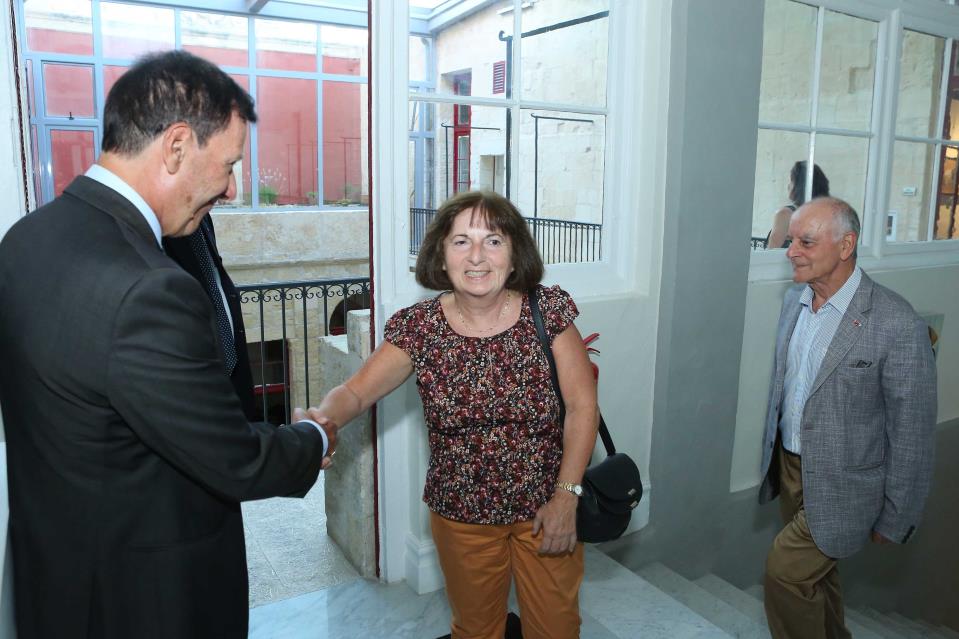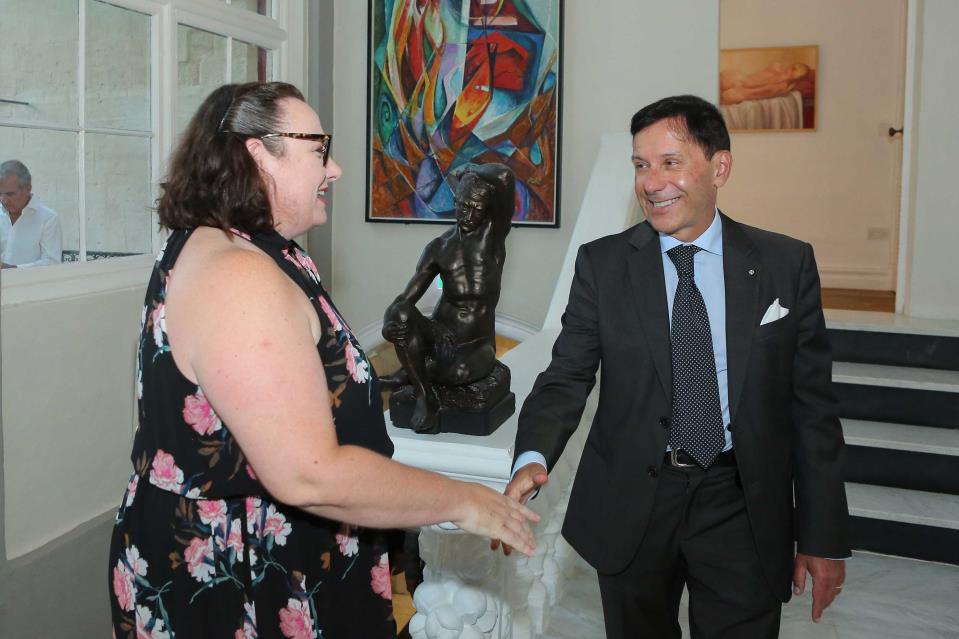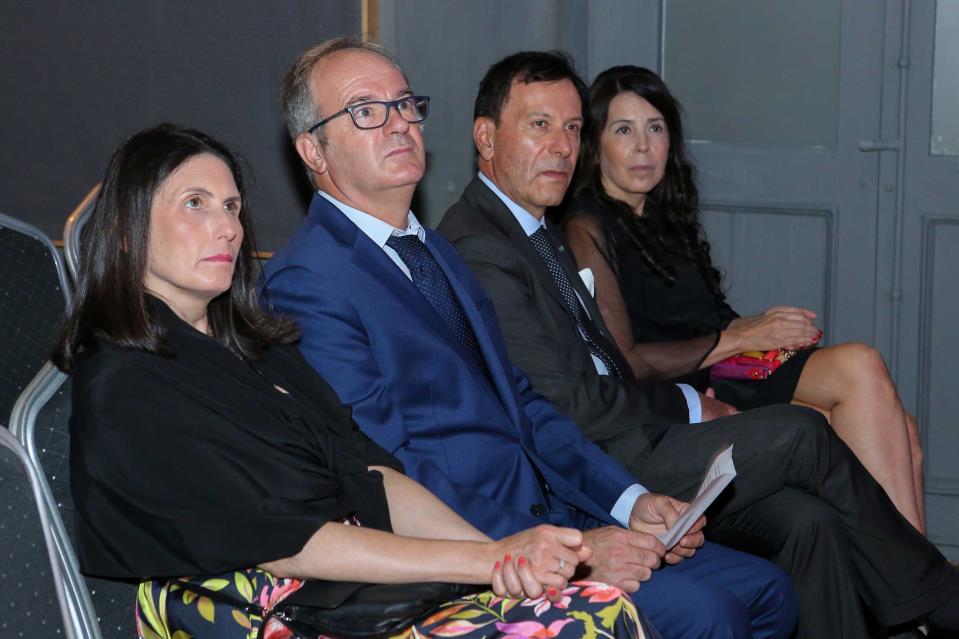On the occasion of the twinning of Valletta and Cortona, the Italian Embassy invited the award-winning pianist Francesco Attesti to give a concert in Malta. The maestro also happens to be the deputy mayor of Cortona where Valletta's architect, Francesco Laparelli was born. This year also happens to be the fifth centenary of the birth of Laparelli. The Embassy was also celebrating the visit of the splendid training ship, Amerigo Vespucci which has returned to Malta after eleven years. With all these celebrations in mind the Italian Embassy had every reason to spoil its guests by bringing out a celebrated pianist.
All seats at Palazzo de la Salle were occupied both downstairs and upstairs by the great and the good: ambassadors, consuls and other guests. The programme notes about the pianist were written in Italian but with an insert in English, a wise decision. Nothing annoys me more than when, in front of an international audience, a concert, a book launch everything is spoken in Maltese, the height of bad manners.

Dottoressa Anna Procheddu who we identify with the Istituto Italiano di Cultura
I had one look at the programme and felt pleased instantly. Pescetti (but who is he? Obviously born before me.) Verdi, Rossini, Schubert, Chopin and Piazzolla, a roll-call of delight. The Romantics. Even when heard in large doses none of these would have given me musical indigestion.
Verdi's Valzer turned out to be so familiar after all, played in Il Gattopardo.

The Chargé d’Affaires of the Embassy of the U.S. Gwodolyn “Wendy” Green
In 19th century Italy, Giuseppe Verdi stood head and shoulders above all others. My question is always: how did Titans like Verdi come to be? Verdi's 26 operas are packed full of great tunes and many of them are still performed today. They include many of the best-known operatic areas of all time. When Aïda received its premiere, the standing ovation at the end was so prolonged that the company made no fewer than 32 curtain calls.
But Verdi also faced the slings and arrows of life as he outlived both his wives and two of his children. A musician to the end he left his considerable wealth to a retirement home for musicians which he had built in Milan.
His parents ran an inn where he was born, in Roncole di Bussetto not far from Parma. The inn, close as it was to the road going from Parma and San Donnino to the river Po and Cremona, catered for wayfarers and stagecoach passengers. Occasionally it may have done so even for Bonaparte's soldiers, for France still ruled the dukedom and the birth of the baby was registered with the French names of Joseph Fortunin François. It doesn't look as if there was music in his family and yet he was such a genius and with a huge following the world over, to this very day.
Another surprise in the programme was Rossini's Ouverture from The Barber of Seville. Rossini claimed to have composed this opera in just 13 days. I am so used to this overture being played by an orchestra that I was taken by surprise seeing it on the programme. It is famous and familiar. Right from the very first bars you can feel that the audience was happy with the choice. I loved the piano version, too.
Rossini was another of those composers who created new works very quickly. At the height of his creative powers, he once said: 'Give me a laundry list and I will set it to music.' I doubt anyone called his bluff.
We had two Impromptus from Schubert. The first in Eflat major begins with a lively scale-based melody, the middle goes darker but very lyrical with a haunting melody which many will instantly recognise.
The second Impromptu in A flat is soft and sweet at the beginning and end and then loud and forceful in the middle.
And then it was time for Chopin. Aimez-vous Chopin? Do you remember Françoise Sagan's novel? I ask a rhetorical question for who doesn't like Chopin. Certainly, no one that I know or indeed want to know.

The mayor of Cortona Luciano Meoni & his Siga and the Ambassador of Italy, Fabrizio Romano and his wife Siga Nancy Milesis
So, Francesco Attesti gave us two beautiful and familiar pieces: Waltz in A flat, crisp and poignant, sensitively played. The second was the Mazurka in A minor. Also familiar which many a student attempts to study.
But there was a third Chopin piece, the difficult Scherzo no 3 in C sharp minor. This is tightly constructed and quite fierce, at the beginning it sounds like Liszt. But there is also a lyrical section. This is Chopin the romantic after all and wants to touch our hearts in whatever he composes. The pianist really showed us his capabilities here. It is such a difficult piece to perform. Francesco Attesti must have been exhausted at the end of it. Bravo and Bravo again! Then we really knew he is a great pianist.
Last we had Piazzolla, no not Liber Tango but two of his Estaciones Porteñas his four seasons of which the pianist played summer and winter.
It is impossible not to like a Piazzolla composition. Another genius who introduced Jazz to the tango. Moreover, it was pointed out in the programme that Piazzolla is 'di origine Toscano-pugliese'. So there we have it!
I have not mentioned the speeches of H.E. the Italian ambassador, the mayor of Cortona or the mayor of Valletta but they gave us an insight in what the occasion was about.
Italian generosity towards Malta is well known. How many have enjoyed Italian scholarships of all kinds over the years? Thousands. So many musicians brought over to entertain us, and always, only the best. But not only musicians of course.
Francesco Attesti finished off with a most pleasant piece, written by a 20-year-old who won a music competition in Cortona. I am relying on my memory. I hope I got it right even if I have forgotten the name of the young composer.
The pianist plays with warmth and is unostentatious. Ah! the studies and hours, weeks, months, years of practice that lie behind what looks so deceptively simple. The blood, sweat and tears. It was a most pleasant evening in every way. Another slice of Italian generosity. Another thank you per vostro generosità Sua Eccelenza.
[email protected]